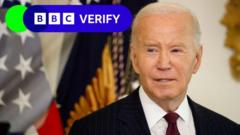President Joe Biden’s recent decision to pardon his son Hunter Biden has sparked significant controversy and raised questions about presidential pardons and judicial independence. Despite previous assurances that he would not intervene in his son’s legal matters, Biden issued a sweeping pardon on Sunday, citing what he described as a “miscarriage of justice” targeting his son.
Hunter Biden had previously pleaded guilty to federal tax charges and lying about drug use on a firearm purchase form. In the aftermath of his conviction, the White House had consistently maintained that a presidential pardon was not being considered. In June, Biden explicitly told reporters, “I will not pardon him” and seemed satisfied that his son had received a fair trial.
The pardon is unprecedented in several key aspects. It covers potential crimes committed over an almost 11-year period from January 2014 to December 2024, which experts consider highly unusual. Additionally, Hunter Biden has not yet been sentenced, making this pardon atypical, as the U.S. Justice Department notes it is uncommon to pardon someone before sentencing.
Republicans have swiftly condemned the move. President-elect Donald Trump called it an “abuse,” while House Oversight Committee chair James Comer accused Biden of attempting to “avoid accountability.” The pardon has reignited debates about the independence of the justice system and the appropriate use of presidential pardoning power.
While presidential pardons of family members are not entirely unprecedented, Biden’s action stands out. Previous examples include Bill Clinton pardoning his half-brother for drug distribution convictions and Donald Trump pardoning his son-in-law’s father for various financial crimes. However, no president has previously pardoned their own son.
The irony is not lost on political observers, given Biden’s previous criticism of Trump’s pardons. In the past, Biden had condemned Trump for pardoning military personnel accused of war crimes and commuting the sentence of Roger Stone, arguing that such actions undermined the rule of law and politicized the justice system.
Experts like Jeffrey Crouch from American University have pointed out that typically, there is a recommended five-year waiting period before applying for a presidential pardon. The breadth and timing of Hunter Biden’s pardon deviate significantly from these established norms.
The move has cast a renewed spotlight on the presidential pardon power and its potential for political manipulation. While the Constitution grants presidents broad pardoning authority, each use of this power continues to be scrutinized for its potential political motivations and implications for judicial fairness.
As the controversy unfolds, the pardon raises complex questions about presidential discretion, family dynamics in politics, and the boundaries of executive power in the U.S. judicial system.




